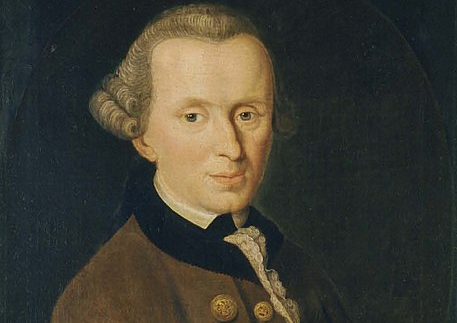
The German philosopher Immanuel Kant (1724–1804) is one of the most important philosophers in the history of mankind.
Apart from the intrinsic and extrinsic value of being a goodphilosopher, what makes a philosopher important?
Well, what makes any historical figure ‘important’?
Arguably, someone has been weighty when he or she had a significantinfluence.
Hence, when a philosopher wrote texts of which we now say that they shaped his or her era, we might say that he mattered much.
Kant, for instance, lived in the historical period that we refer to as the “Age of Enlightenment”.
And, as it happens, his essay An Answer To The Question: What is Enlightenment (1784) is one of the foundational texts of this crucial period in Western history.
In it, Kant — normally known for cold, rational argumentation — surprises his readers with a heartfelt account of what he feels makes life worth living.

Enlightenment as historical period
To understand Kant’s passionate plea, we need to understand its context.
What, again, was the Enlightenment?
The Age of Enlightenment comes after the Scientific Revolution that starts with the Copernican Revolution (1543) and ends with the Isaac Newton’s Philosophiæ Naturalis Principia Mathematica (1687), giving rise to ‘modern science’.
Building on this, the Enlightenment, as an historical period, induced a very noteworthy change in ideas of what matters:
“In the Enlightenment, freedom, democracy and reason became the primary values of society. It started from the standpoint that [people’s] minds should be freed from ignorance, from superstition and from the arbitrary powers of the State, to allow mankind to achieve progress and perfection. The period was marked by a further decline in the influence of the church, governmental consolidation and greater rights for the common people.”
Whereas preceding moralities saw inherent differences between different types of persons (man and women, for example) as justified grounds for treating them differently, such theories came under increasing scrutiny during the Enlightenment as thinkers began to question the assumption that some human beings are inherently better than other human beings.
As the Scottish philosopher David Hume wrote in 1751, Enlightenment morality means that one should see oneself as a member of “the party of humankind, against vice and disorder, its common enemy”.
It’s not a coincidence that such Enlightenment ideals played a major role in inspiring the French Revolution (1789) and were incorporated into the United States Declaration of Independence (1776).
I love history and could write about this for days, but I will get to the point.

Cool, but what I should I care?
History is fun, but why should it matter to me?
First of all, it matters because now you have a reason to trade your Netflix subscription for a subscription to your local library.
Second, it matters because now you will stop hanging out with your lame friends who make fun of studying history.
And, last but not least, you don’t really understand why we value what we value without an understanding of how we came to hold these values.
The Enlightenment played a major role in shaping our present-day liberal society, because it was during this period that first people realized that societies which accord equal value to human beings as such are better forpeople and that this is one reason to have them.
The fundamental insight of ‘Enlightenment progress’ is a commitment to the intrinsic value of humanity. All other tenets of Enlightenment thought — individual rights, the pursuit of happiness, democracy, freedom — follow from this basic principle.
It’s not about knowledge, but about courage
With our rough understanding of what the substantive ethical changes of the Enlightenment Age are and how they relate to our current values, let’s see if we can discover what explains those changes themselves.
This is where Kant comes in, as he had some very interesting ideas on this point.
In his essay — remember, written in 1784 — he famously declares:
“Sapere aude! Have courage to make use of your own understanding! This is the motto of the Enlightenment.”
‘Sapere aude’ is a line from the Roman poet Horace (65 BC — 8 BC), and means ‘Dare to be wise’.
Kant’s explanation for why most people don’t seem particularly keen on accepting this challenge is even more interesting:
“Enlightenment is the human being’s emergence from his self-incurred‘minority’. ‘Minority’ is inability to make use of one’s own understanding without direction from another. This minority is self-incurred when its cause lies not in lack of understanding but in lack of resolution and courage to use it without direction from another.”
People do not lack the skill to think for themselves, but lack the courage.
If societies lack this courage but instead let their beliefs about right and wrong be directed by an authority such as the church, critical thinking will fade and injustices will remain.
Conversely, if men and women “have the courage to make use of their own understanding”, they will call authorities out on fallacies and injustices.
With its emphasis on reason, it is the increased adoption of such a stance that characterizes the Age of Enlightenment.
Hence, it was not an increase in knowledge that explains the moral progress of the Enlightenment — it was a shift in attitude.

The importance of thinking for yourself
“It is a fact of human life that one must eventually choose a philosophy.” -Amor Towles
As mentioned, Kant observed that this independent attitude does not come easily to most people and is deadly honest in his assessment of why this is the case:
“It is because of laziness and cowardice that so great a part of humanity gladly remains ‘minors’ for life.”
Saying “I became a farmer because I chose to” is a lot scarier than saying “I became a farmer because my parents had a farm and I’m their only kid”.
The latter narrative lets you off the hook. It says: ‘My life might not be what I expected of it but that’s not because I made a mistake — I simply didn’t have a choice’. The former interpretation, by contrast, does imply that you are the one who is responsible for how your life unfolds.
If a good life is of our own making, a sub-par life is similarly due to ourselves.
It seems that most people are not willing to take this risk because they are too afraid of making an error that will result in them being a flop:
“If I have a book that understands for me, a spiritual advisor who has a conscience for me, a doctor who decides upon a regimen for me, and so forth, I need not trouble myself at all. I need not think; others will undertake the irksome business for me.”
Almost 250 years later, independent thinking is still something that we don’t have enough of yet. As Elon Musk notes:
“I think generally people’s thinking process is too bound by convention or analogy to prior experiences. It’s rare that people try to think of something on a first principles basis. They’ll say, “We’ll do that because it’s always been done that way.” Or they’ll not do it because “Well, nobody’s ever done that, so it must not be good.” But that’s just a ridiculous way to think. You have to build up the reasoning from the ground up — “from the first principles” is the phrase that’s used in physics. You look at the fundamentals and construct your reasoning from that, and then you see if you have a conclusion that works or doesn’t work, and it may or may not be different from what people have done in the past.”
Unfortunately, enlightenment progress is far from complete.

Cool, but I still don’t see why I should care
“It takes half your life before you discover life is a do-it-yourself project.” — Napoleon Hill
You might wonder what’s so great about making up your own mind.
It’s quite comfortable to take the definition of “right” that we are brought up with, or that is accepted in our society, and use that as a guide to living well without too much questioning. It is a lot harder and scarier to make your own judgments about this deep stuff and to consequently be responsible for your verdicts, choices and their outcomes.
So why bother, why risk it, why stick your neck out?
Because, a life that is not based on your own value judgments is infinitely less meaningful.
Your job, your hobbies, your friends, your interests, are these things mostly a result of what was told to you or pushed on you, or are they things that you consciously evaluated and chose based on how enriching and passionate they made you feel?
These are important questions, and you have to answer them, because if you sleepwalk through life not ever questioning or evaluating the lifestyle you’ve built for yourself, you’ll end up miserable — being less than we can be and not living on our own terms messes up our self-image.
That being so, it’s of the highest importance that you have the courage to use your own reasoning to decide on your first principles, as Musk called them, and build up your life-philosophy from there.
After all, someone might have sold you the wrong plan.
The Enlightenment didn’t come easily — values were meant to be costly. In the game of life, the price of true winning is playing with all your heart and all your mind.
As Socrates strikingly explained:
“The unexamined life is not worth living.”
According to Socrates, if the way you lead your life is not based on your own examinations and conclusions about what matters, it’s not worth it.
That’s why you should care.
Like to read?
Join my Thinking Together newsletter for a free weekly dose of similarly high-quality mind-expanding ideas.
